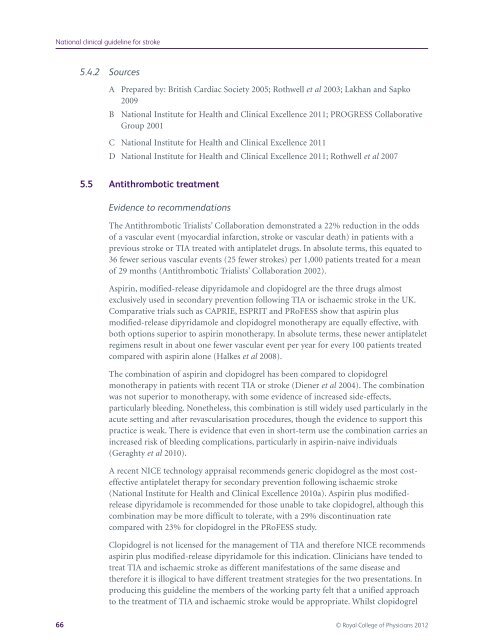national-clinical-guidelines-for-stroke-fourth-edition
national-clinical-guidelines-for-stroke-fourth-edition
national-clinical-guidelines-for-stroke-fourth-edition
Create successful ePaper yourself
Turn your PDF publications into a flip-book with our unique Google optimized e-Paper software.
National <strong>clinical</strong> guideline <strong>for</strong> <strong>stroke</strong><br />
5.4.2 Sources<br />
A Prepared by: British Cardiac Society 2005; Rothwell et al 2003; Lakhan and Sapko<br />
2009<br />
B National Institute <strong>for</strong> Health and Clinical Excellence 2011; PROGRESS Collaborative<br />
Group 2001<br />
C National Institute <strong>for</strong> Health and Clinical Excellence 2011<br />
D National Institute <strong>for</strong> Health and Clinical Excellence 2011; Rothwell et al 2007<br />
5.5 Antithrombotic treatment<br />
Evidence to recommendations<br />
The Antithrombotic Trialists’ Collaboration demonstrated a 22% reduction in the odds<br />
of a vascular event (myocardial infarction, <strong>stroke</strong> or vascular death) in patients with a<br />
previous <strong>stroke</strong> or TIA treated with antiplatelet drugs. In absolute terms, this equated to<br />
36 fewer serious vascular events (25 fewer <strong>stroke</strong>s) per 1,000 patients treated <strong>for</strong> a mean<br />
of 29 months (Antithrombotic Trialists’ Collaboration 2002).<br />
Aspirin, modified-release dipyridamole and clopidogrel are the three drugs almost<br />
exclusively used in secondary prevention following TIA or ischaemic <strong>stroke</strong> in the UK.<br />
Comparative trials such as CAPRIE, ESPRIT and PRoFESS show that aspirin plus<br />
modified-release dipyridamole and clopidogrel monotherapy are equally effective, with<br />
both options superior to aspirin monotherapy. In absolute terms, these newer antiplatelet<br />
regimens result in about one fewer vascular event per year <strong>for</strong> every 100 patients treated<br />
compared with aspirin alone (Halkes et al 2008).<br />
The combination of aspirin and clopidogrel has been compared to clopidogrel<br />
monotherapy in patients with recent TIA or <strong>stroke</strong> (Diener et al 2004). The combination<br />
was not superior to monotherapy, with some evidence of increased side-effects,<br />
particularly bleeding. Nonetheless, this combination is still widely used particularly in the<br />
acute setting and after revascularisation procedures, though the evidence to support this<br />
practice is weak. There is evidence that even in short-term use the combination carries an<br />
increased risk of bleeding complications, particularly in aspirin-naive individuals<br />
(Geraghty et al 2010).<br />
A recent NICE technology appraisal recommends generic clopidogrel as the most costeffective<br />
antiplatelet therapy <strong>for</strong> secondary prevention following ischaemic <strong>stroke</strong><br />
(National Institute <strong>for</strong> Health and Clinical Excellence 2010a). Aspirin plus modifiedrelease<br />
dipyridamole is recommended <strong>for</strong> those unable to take clopidogrel, although this<br />
combination may be more difficult to tolerate, with a 29% discontinuation rate<br />
compared with 23% <strong>for</strong> clopidogrel in the PRoFESS study.<br />
Clopidogrel is not licensed <strong>for</strong> the management of TIA and there<strong>for</strong>e NICE recommends<br />
aspirin plus modified-release dipyridamole <strong>for</strong> this indication. Clinicians have tended to<br />
treat TIA and ischaemic <strong>stroke</strong> as different manifestations of the same disease and<br />
there<strong>for</strong>e it is illogical to have different treatment strategies <strong>for</strong> the two presentations. In<br />
producing this guideline the members of the working party felt that a unified approach<br />
to the treatment of TIA and ischaemic <strong>stroke</strong> would be appropriate. Whilst clopidogrel<br />
66 © Royal College of Physicians 2012


